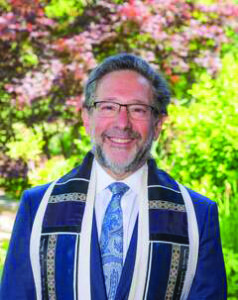
By Rabbi Gregory Marx
Sukkot
The holiday of Sukkot is without a doubt one of my favorite festivals. The moon is full, the weather is, more often than not, cool in the evenings. The leaves are turning from their verdant green of the summer to the reds, yellows and oranges of fall. It is a wondrous time.
As for me, I am coming “down,” if you will, from the pressures of the High Holy Days. I love Sukkot.
Where else can we look for a critical lesson about appreciation and wonderment for the times of our lives than the Torah reading for the Shabbat of Sukkot?
In it, we learn about Moses approaching God and asking to see “God’s face.” This is actually not a particularly unusual request. It says elsewhere in Torah that Moses knew God “face to face.” Most religious teachings focus on its founder “knowing God.”
But here, during the intermediate days of Sukkot, God pushes back against Moses’ request. God says, “I will make all my goodness pass before you, and I will proclaim before you the name Eternal and the grace that I grant and the compassion that I show… But you cannot see my face, for no human being may not see me and live … See, there is a place near me. Station yourself on the rock. And as My Presence passes by, I will … shield you with My hand until I have passed by. Then I will take My hand away and you will see My back, but My face must not be seen.”
What actually transpired at that moment?
There are some who say that Moses was only allowed to see traces of God. It has been compared to seeing the wake of a boat but not the actual vessel. Or, perhaps, human wisdom, compassion or generosity are the traces of God that we can “see,” while not actually knowing God. Others believe that it is a teaching about life after death. Moses would be able to see God face-to-face upon his demise but not during life.
I would like to suggest a fourth option. Moses was allowed to see what truly mattered in life. He could see in an instant when God revealed His back, the sacred not the profane. If Moses was seeing only God’s back, then Moses was looking in the same direction, theoretically, as God. Moses was allowed to perceive what God was seeing. It is the difference between looking into God’s eyes and looking through God’s eyes.
Imagine for just a moment that Moses could see what truly mattered in life. Rudolph Otto, the theologian, called this the Mysterium Tremendum, the great mystery of being. For that brief moment, perhaps it was just an instance, Moses had that “aha” moment where he could see and realize the profundity of life as opposed to the small annoyances of everyday living.
Too often we get distracted or aggravated by the little things of life. Having to wait on the phone for a customer representative who “values my time,” but makes me wait for 45 minutes, the dripping kitchen faucet that we’ve been meaning to fix which consistently annoys.
Too often, the little things in life distract us from the beauty and the wonderment of life. A friend of mine once called it “the missing tiles syndrome.” If we look up at a magnificent fresco or mosaic, we, too, often gravitate to the missing tiles, the flaws, the imperfections, rather than marveling at the wonderment.
There are some faiths that will tell us that the essence of life is to look into God’s eyes, to have a personal relationship with God. All we can hope for, according to the Torah, is to look through God’s eyes and to see what truly matters in life. And what does our tradition value? All the intangible things that cannot be qualified or quantified. Life is made meaningful with wonderment, gratitude, love, hope, faith, courage and integrity.
As we celebrate this glorious season, may we “look through God’s eyes” as Moses briefly did and give thanks for the splendor and majesty of the moment.
Rabbi Gregory Marx is the senior rabbi at Congregation Beth Or in Maple Glen. The Board of Rabbis of Greater Philadelphia is proud to provide diverse perspectives on Torah commentary for the Jewish Exponent. The opinions expressed in this column are the author’s own and do not reflect the view of the Board of Rabbis.




When read correctly your fourth renderment is very precice. How Moses saw God, “produced the law”. The law was not perfect, but it is good, it was seen in part, it was given in part. That was the sum of that equation. If Moses could of saw God, in entirerly, the sum would of been, the promise by faith. The promise was born first, the law second. The law is important , because it bares childeren to God. Just as Eve was cursed to bare children, (for the good to populate the kingdom), the law brings forth the children of God in the same way. That is all that God is showing in that picture.